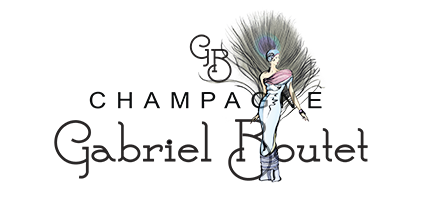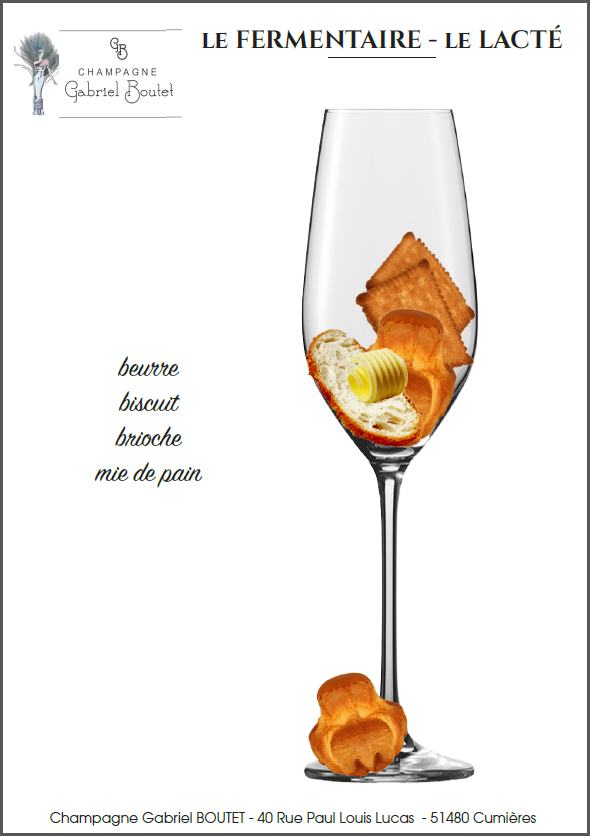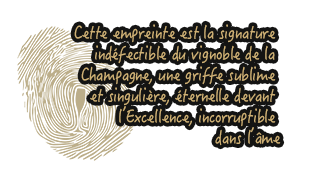
HOW TO DRINK CHAMPaGNE AND ENJOY IT : FOLLOW THE LINK

https://www.express.co.uk/news/uk/63380/It-s-official-the-British-invented-champagne
http://www.lhebdoduvendredi.com/article/35162/nouveau-coup-de-pub-pour-la-champagne
THE VINE GROWER
Luc is the grandson of Gabriel Boutet himself the grandson of the founder from the house Gabriel Boutet. The label is still on the bottle to honor all the Boutet who worked very hard during years into the vineyards and for the champagne!
Luc studied special course after accounting and law. As a child he enjoyed helping his father in the vineyard. After starting oenology at the famous viticole school in Avize, where he met Patricia in the same classroom, both of them learned vine pruning and wine making.
Luc takes part of the process making close to the nature and feel her proved to produce quality grapes who find their way into quality bottles of Champagne.

PRUNING
Pruning the vine stocks, is giving health into them. Luc does not prune to give the harvest yield, but to give the best benefit to each individual plant. He works together with his worker manned Franck I.To have good wood he cuts and prune right down into ground to have healthy new growth.




IN THE VINEYARDS
Before harvest he looks to see how many pips are brown. When he finds lots of them he makes analyze from sugar, acidity and pH. The most important thing to do to have a good wine and champagne is to grow healthy grapes. In our vineyards we try to distribute and restrict realization and especially nitrogen. It makes training the vines easier and gives better wine and further on more aromatic Champagne!
We invite you to join us, to visit our Vineyards and Cave
During HARVEST ONLY for 28€ you'll have a unique opportunity to participate in the process of picking the grapes, and taste the freshly pressed juice.
This tour is limited to 15 people to provide a personalized experience. It is possible to visit one of the more well known champagne houses by special appointment.
Important information about grape varieties and the harvesting process will be provided. We will open cellars and give you fresh juice to taste.
Superb paté croûte will accompany our Champagne Brut Grande reserve and a brioche made by the baker of Cumières will be served with our Champagne Rosé.
ALL THE YEAR ROUND
You will learn the history of champagne. The “terroir” containing 70 million year old chalk( cocco lithe) and the process of champagne growing in this region around Epernay.
In our estate where you will have a tasting of 2 or 3 champagne blends you’ll learn the different characteristics of Chardonnay, Pinot Noir and Pinot Meunier (Rosé).

You can print this part fo the page with the image it is free of rights
COLOR
White Champagne:
Green gold - grey gold- straw yellow - yellow gold - old gold
Rosé Champagne:
Pale - pink powder - pink deep - pink - salmon pink
Name of the Champagne: ..........................................Vintage……………………
Structure: lively - lightweight - lush - creamy - firmly structured - round - full-bodied - complex…
Floral: white flowers - lime flower - orange blossom
Fruity: citrus seeded - fruits - yellow fruits - exotic fruits - red fruits- Various..
Mineral: spices - vegetal - other..................................
Fruits: ripe fruits - crystallized fruits - honey - beeswax - brioche - Danish pastry –
Dried fruits: nuts- dried flowers – vanilla……..
Baked or roasted: caramel - gingerbread - quince jelly - toasted pastry- mocha – coffee…..
Prix selon prestations *à partir de 18€
CHARDONNAY 100 % 3/4 Chardonnay & 1/4 Pinot Noir Pinot Noir


These pictures are a creation from Francine MANCEL they belong to here by copyright
Champagne 5 - 8 years base Pinot Noir Champagne 6 - 10 ans Chardonnay

Please do not do copy this documents
22, rue de l'Industrie 67400 ILLKIRCH-GRAFFENSTADEN
http://www.portrait-du-vin.fr/
https://www.facebook.com/portraitduvin/
https://www.instagram.com/portraitduvin/?hl

Vintage Blanc de Noirs AGED IN DARK CELLAR, SUITABLE FOR VEGETARIAN
Grown and bottled for you by the winemaker Luc the small and historic champagne house Gabriel Boutet located in the heart of the Champagne region at CUMIERES on the north bank of the river Marne. Dominated with elegance by Pinot noir, this luscious Champagne is the family favorite due. The aroma of ripe fruits gives a succulent body and his delicate bubbles long finish. This wine pairs extremely well with simple dishes such as roast chicken cured meats and creamy pasta, or old cheese from Holland.
25% of this Champagne has not done his malo lactic cycle. Pinot Noir 60 % Chardonnay 40 % dosage 5g Drink chilled at 7°C.
This scourge that threatens us all - whether we are powerful or not - is an unprecedented global crisis of modern times ...
In a crisis, we have to step back. The crisis that each of us undergoes in our own way, impacts us all in our daily life either by a radical and cessation of activities or by too much of work. We all fight each one isolated but together. Caregivers, hygiene officials, garbage collectors, truckers, cashiers and many others are outside at the front ... while teachers and professors are working by telework ath french administration including the courts are closed ...
Origin of the word crisis
The etymological meaning of the Greek term krisis ("κρισις") and derivatives krino krinau, krinein ".
In Latin "crisis" meaning assault, separated, decided, distinguish, separate, sort. In Latin "cerno", "cernere" is one of the descendants of the infinitive "krinein" from the Greek meaning "judge".
In French the current meaning of "crisis" is used to designate a period of difficulties. The term crisis evolves from "period of tension" or "rapid change" towards "questioning" or "difficult period", even "tense situation", "making a choice" and "deciding". The crisis is a situation where the principles on which an activity is based are called into question. "
Nowdays the word "crisis" broadly covers the meanings of "disturbance", and thereby anxiety, attack, surge of, or even recession or cataclysm without however including the choices or the related decisions which would make it possible to annihilate the causes of these disturbances.
A crisis can also be likened to Kaïros (Καιρός) "opportune moment, occasion".
In the ancient Hebrew the root of the word crisis means "to think, to examine, to wait, to hope" but at the same time represents the wheat which is the economic dimension.

What is time?
Cyclical or linear, time is a graspable continuity by comparing the same element at several successive moments, and dividing it by sequence. Time transforms and is visible through what is transformed.
Cyclical or linear, time is a graspable continuity by comparing the same element
at several successive moments, and dividing it by sequence. Time transforms and is visible through what is transformed.
Designs have changed over the centuries
For Aristotle (384–322) BC, time is only explained by the changes we perceive around us.
For Isaac Newton (1643–1727) time is immutable like space. The stars describe their orbit there, moved by a divine force.
For Ludwig Boltzmann (1844-1906) the "Arrow of time" makes the phenomena irreversible. Thus, the melted sugar never becomes a lump.
For Albert Einstein (1879-1955) Time slows down more slowly near a mass in a gravitational field. Its measurement only makes sense locally.
Scientists today have experimented with knowing the difference in the actual flow of time is the same on clocks. We know that the time of a clock placed at the top of Everest, runs each year at 16 milliseconds more than on the clock placed at sea level where the gravitational field is more intense than at the top of the mountain.
Time in music
Music would not exist without time. In music there is pulsation, rhythm, measure, acceleration or deceleration, silence too. We use tempo, speed of execution. You can count the number of pulses per minute using a metronome - from 30 to 60 beats per minute for slow tempos. The rapids exceed 200.
But the weather is not smooth. The pulsation is obtained when the structures of duration refer to chronometric time. Smooth time is when time streaks are replaced by a duration. In some old songs, the text and its accentuation determine the value of a note.
Time in art
Guiseppe Arcimboldo (1526 1593) painted the chain of seasons to materialize time.
Gustave Klimt (1862 1918) painted the three ages by juxtaposing three faces of the same woman to signify the passage from one age to another on his painting.
For several centuries until the Renaissance, vanities found their place in paintings that metaphorically recall the relationship to time. In the painting by Philippe de Champaigne (1602 1674) the reflection of death is symbolized by a human skull which reminds us of the tragic outcome of our lives. The hourglass next to the skull goes beyond the simple reference, it allows us to measure the time that elapses like sand. The blooming tulip in the vase suggests wilting, which damages timeless vanities.
In the twentieth century
Fernando Botero (1932) we find an earthworm in an apple
Chez Dali (1904 - 1989) the clock which is the most direct reference. It highlights the fluid character of time through flowing clocks.
The time between painting and poetry
Marc Chagall (1887-1985) translates the poetry Le Lac de Lamartine where time has no shore with a flying fish referring to the ves "Man has no sleep, time has no shore, it sinks and we pass, while the clock is suspended in the air…
Time in mythology
Devouring your children can seem incongruous, even imaginable, especially for a divinity. However, this is what the god Saturn (Cronus) did, which brings back the cruelty of passing time
TIME IN OUR DAILY LIVES
Space is a sign of our power and time, a sign of our helplessness in the face of its finitude. Man feels that he is only a man. It requires humility. We can't get our hands on this leaky thing by going as we try to "catch it".
For those who have read the Stroumpfs. You, remember that by wanting to get the clock that goes back in time Gargamel wants to control his life and more the universe. This attitude no longer leaves providence.
For those who meditate on the approach of time is knowing how to situate themselves between daylight and the darkness of the night, it is the intermediary between shadow and reality.
Sometimes there are moments that seem to last a long time, others pass very quickly. Maybe sometimes we believe in the existence of a modulation of time which would be induced by the rhythm of our activities and our attention. But in reality, what we perceive of the passing time does not change anything in its way of passing, whether we are deepened in the expectation of a deliverance or in the frenzy of the action of this same deliverance. A minute lasts a minute, although our brain feels like a very bad stopwatch.
And in these troubled times often there is no longer a reference point in time,
it remains yesterday, today and tomorrow and that is all of our Eternity for the moment at the present time.
A crisis can only be overcome by the hope which gives thought and a certain way of seeing to perceive the world in order to give new meaning to our existence and to society itself.

Easter time. A time of rebirth and joy, of renewal of nature. This year many of us will not be celebrating with family. Far from the usual frenzy that usually drives Easter weekdays and weekends, I have time. Sometimes too long. I even have time to fight the invisible while confining myself. This confinement time allows us to do so.
This time reminds me of a text by Michel Quoist (1921-1997) that I reproduce slightly modified.
So men all run after time.
They run over the earth running, pressed, jostled, overloaded, panicked, overwhelmed
… /…
Now…
I have all my time, all the time You give me,
the years of my life, the days of my life, the days of my years,
the hours of my days, they are all mine.
It’s up to me to fill them, calmly, calmly, but to fill them to the brim,
to offer them, and let a generous wine come out, as it once did in Cana.
Tonight I ask for the grace to conscientiously do,
in time what is given to me, what You want me to do. "
May we all be responsible and understand that to get up we will have to unite and love each other, stick together and support our country by all possible means ...while being aware of the value of the time granted to us.
THANK'S FOR READING if you have any suggestion let me know.
Patricia H Millet Easter 2020








